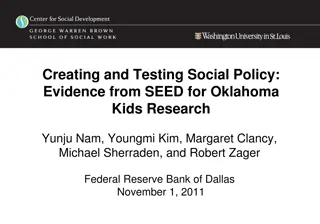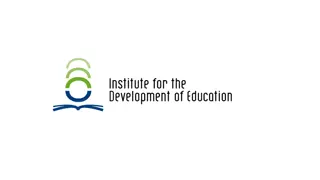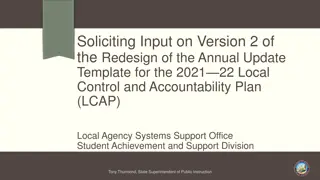
Naturalism in Education: Philosophy and Principles
Naturalism in education emphasizes the study of nature as the ultimate reality, denying the existence of the supernatural. This philosophical approach values scientific exploration of the physical world and focuses on adapting education to align with natural principles and the environment. Key elements include the rejection of spiritualism, stress on the physical universe, and principles such as analyzing reality through natural science. Educators like Herbert Spencer have outlined specific aims of education within this framework, aiming to enable individuals to lead complete lives by focusing on self-preservation, securing necessities, child-rearing, maintaining social relations, and enjoying leisure.
Download Presentation

Please find below an Image/Link to download the presentation.
The content on the website is provided AS IS for your information and personal use only. It may not be sold, licensed, or shared on other websites without obtaining consent from the author. If you encounter any issues during the download, it is possible that the publisher has removed the file from their server.
You are allowed to download the files provided on this website for personal or commercial use, subject to the condition that they are used lawfully. All files are the property of their respective owners.
The content on the website is provided AS IS for your information and personal use only. It may not be sold, licensed, or shared on other websites without obtaining consent from the author.
E N D
Presentation Transcript
Naturalism Naturalism Dr. Kasturi Karmakar Assistant Professor Faculty of Education ICFAI University Tripura
Naturalism Nature is everything, there is nothing beyond it. Nature is also termed as materialism. Man should investigate the truth of nature by scientific methods with all his capacities and resourcefulness. It doesn t believe spiritualism, and supernaturalism. in sentimentalism,
Meaning of Naturalism It emphasis on the nature in every field of education. It does not believe in existence of God. It gave importance to the matter and the physical world. It is a philosophy which considers nature as everything and denies the existence of spirit.
Protagonist of Naturalism J.J. Naturalism Others Aristotle, Comte, Bacon, Darwin, Huxley, Pestalozzi, Froebel Rousseau Champion of Spencer, Tagore,
Definition Naturalism is metaphysics, which considers nature as the whole reality. It excludes what is supernatural or the other world . - Hocking. Naturalism is a term loosely applied in educational theory to systems of training that are not dependent on schools and books, but on the actual life of the education. - Adam
Forms of Naturalism Forms of Naturalism Atomistic Naturalism Scientific Naturalism Mechanical Naturalism Historical Naturalism Physical Naturalism Biological Naturalism
Principles of Naturalism Stress on Physical environment. Universe is a huge machine. Man is also a part of this machine. Reality can be truly analyzed by natural science. The present in the real life, man should try to make this life happy and comfortable. Education in accordance with the nature of the child. Man is the highest creature or animal according to his nature. So the essence of his life is animal instinct and not spiritually.
Aims of Education The aim of education is according to Herbert Spencer, to enable the individual to lead a complete life. it is the general aim, which comprises of five specific objectives. The objectives are as follows: 1) Self-preservation 2) Securing the necessities of life 3) Upbringing children 4) Maintain of social and political relations 5) enjoyment of leisure
Aims of Education Senses are the gateway of knowledge .
Aims of Education Self-expression: Self-expression, not self-realization is an important aims of naturalistic education. Self-Preservation: Education should help the child in self-preservation. It includes self health along with healthy environment. Fullest Development: Naturalism believes that the chief aim of education is the fullest development of the child. Survival of the individual: Naturalism believes that the fittest alone should survive. Education must equipe the child to struggle to exist.
Characteristics of Naturalism Back to nature Negative education It is against bookish knowledge and verbalism Freedom of the child Material education Scientific education Naturalism gives central position to the child in the educational process. Education prepare the child for his future adult life. It gives emphasis on the training of senses as senses are the gateway of knowledge.
Naturalism and Curriculum Naturalist do not advocate a fixed curriculum. Curriculum must be child-centered. It gives place for skills and other useful educational activities. It lay stress on physical education and health training and home science also. It considers literacy subjects as useless and gives no place in the curriculum. Curriculum should contain games, sports, physical culture, biology, physics, nature study, language, history, geography, and other allied subjects.
Naturalism and Curriculum Herbert Spencer classifies all human activities into five and assigns a place to each of them in the curriculum. The five activities in order of priority are i) Activities of self-preservation ii) Activities of a Vocation iii) Activities of a worthy citizenship iv) Activities of a worthy home membership v) Activities of the leisure time
Naturalism and Method of Teaching Naturalism is a result against the old, traditional, bookish system of education. Direct experience with nature, things, and men is the keynote of instruction according to naturalists. They follow different method of teaching according to the interests, capacities, and aptitude of the child Learning by doing Heuristic Method Direct method
Naturalism and Method of Teaching Observation and excursion Play way method Learning through senses Learning through participation Other methods: Naturalists adopt Dalton plan, Kindergarten, Excursion method, Montessori Method, Experimentation so as to bring about a natural development in the child.
Naturalism and Teacher Teacher should behave sympathitically and affectionately forwards the children. Nature- supreme Teacher Teacher the observer Understand about child Teacher the stage setter Teacher the gardener
Naturalism and Discipline Naturalist gives full freedom to the child to perform and learn whatever he likes. No punishment Full freedom Free society Naturalists assume that the child has no knowledge of good and bad, but suffers pain when he makes a mistake, and pleasure when he does something right. Thus he gets reward or punishment for his actions.
Naturalism and Discipline They disapprove of punishment to children. Punishment should be determined by natural consequences of wrong deeds. If the child breaks the windowpane of his room, he should not be punished physically as Rosseau did imagine for Emile.
Naturalism and School School environment should be completely free, flexible and without any rigidity. It should be helpful for the free and natural development of the child. It should be situated in the lap of nature, far away from cities. There should not be any fixed time table and ready dozes of knowledge. School develops the feeling of self learning and self- discipline. It does not want to burden the child with examination. There should be no provision for punishment.
Limitations of Naturalism Naturalism does not offer definite aims of education. It neglects books, which are treasure of knowledge contained in the printed material. Naturalism does not give due importance to the moral and spiritual development of the child. Naturalism assigns very little importance to the teacher in the educative process.
Merits of Naturalism It gives the child a very important place in the educational process. It treats a child as child and not as an adult. The child is good and pure at the terms of birth. It motivates the child to acquire more knowledge in the natural environment. It considers nature as the best teacher in whose company the child learns better. It prepares and encourages the child to engage in experimentation, discoveries and inventions. It considers individual interests, aptitude, inclination, needs and capacities while structuring the curriculum.

















